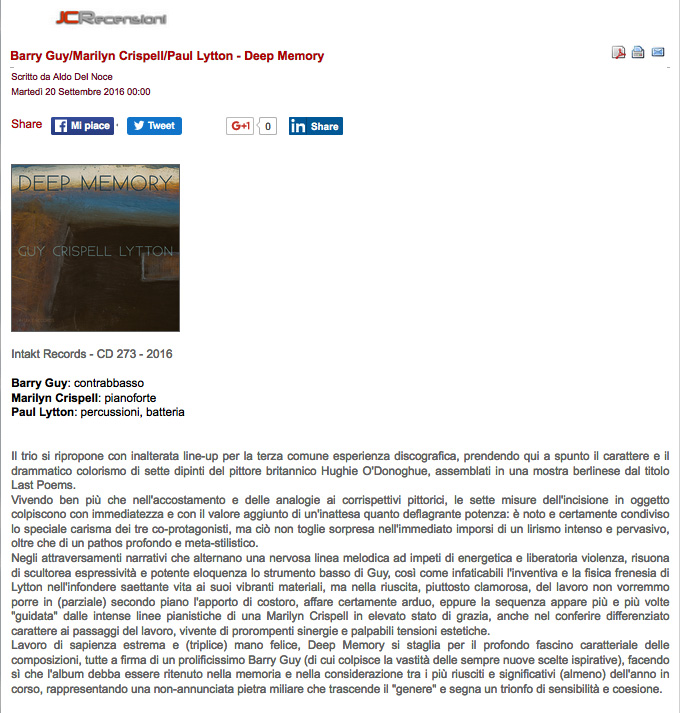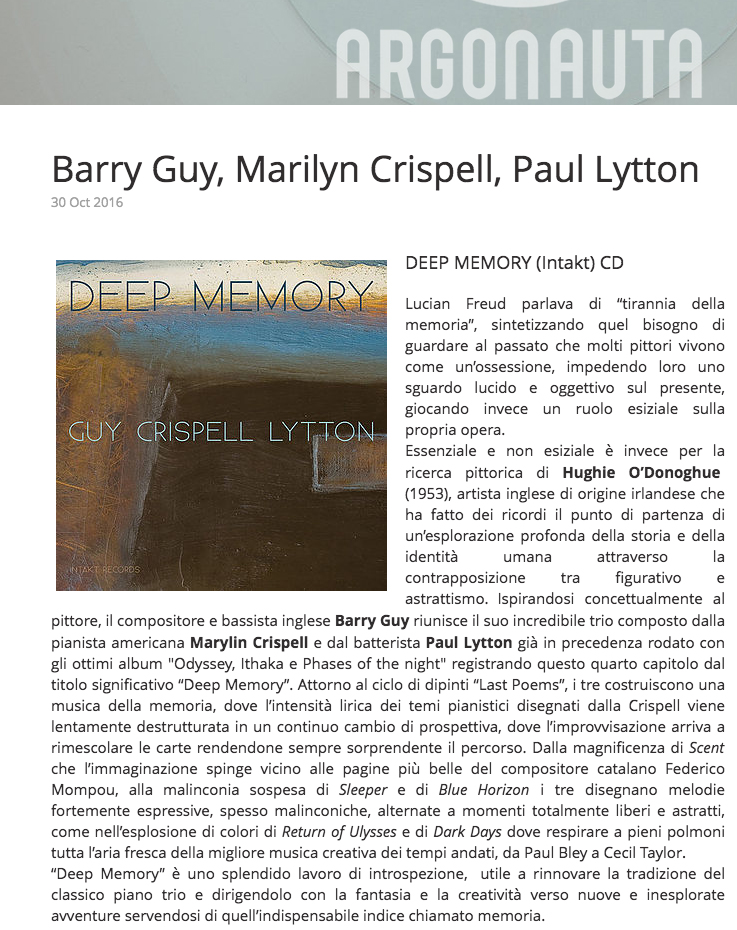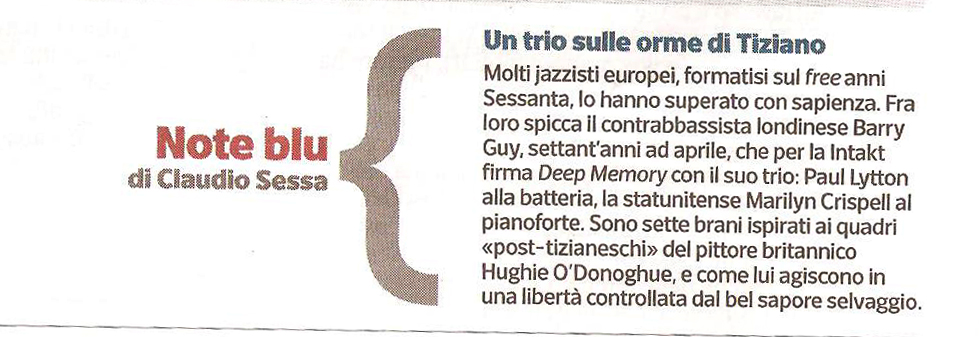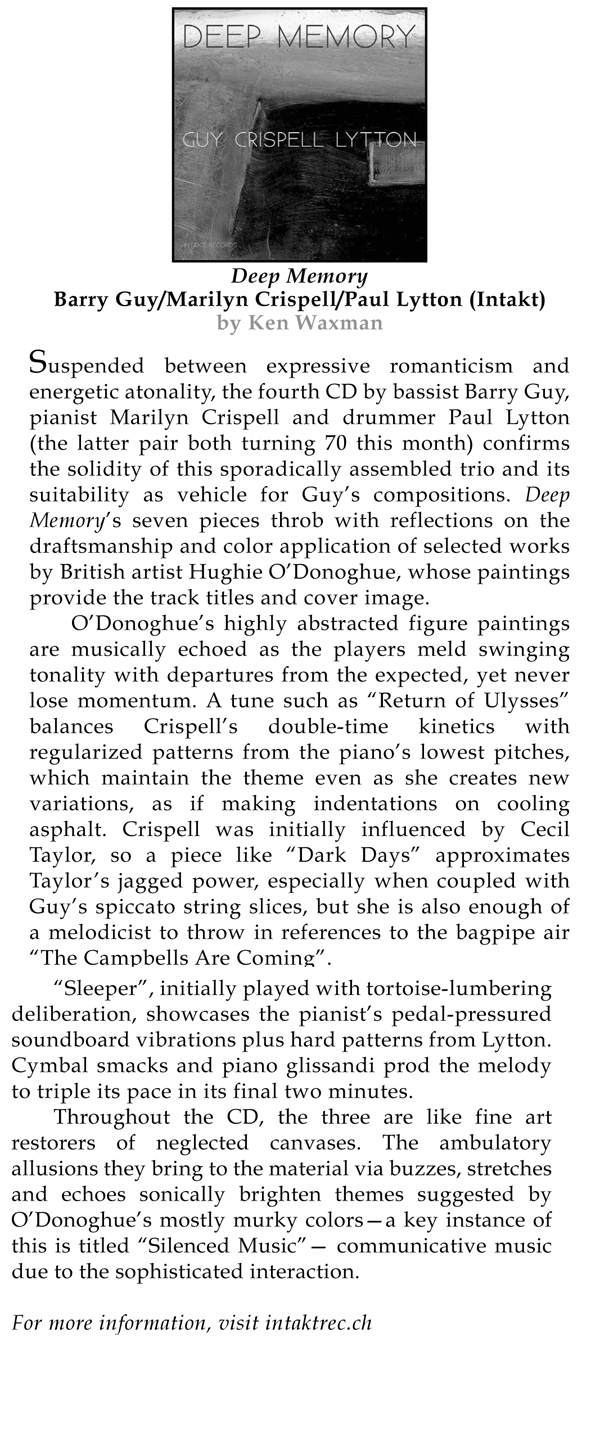INTAKT
RECORDS –
CD-REVIEWS
BARRY GUY - MARILYN CRISPELL - PAUL LYTTON
DEEP MEMORY
Intakt CD 273 / 2016
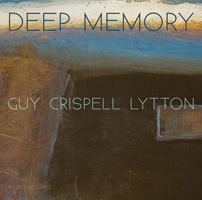
Tor Hammerø, Tor De Jazz, Oslo, Norway, 12. Sept. 2016
Auch die Mythopoesie von BARRY GUY, MARILYN CRISPELL und PAUL LYTTON, die sich
Certain musical aggregations require nothing in the way of fanfare or advance aggrandizement in reminding the faithful of their immediate and manifold merits. The trio of pianist Marilyn Crispell, bassist Barry Guy and drummer Paul Lytton is one such alloy, an assemblage of world-class improvisers that also count compositional music among their expert forte. Deep Memory presents their fourth venture under the auspices of the Swiss Intakt imprint and it’s right on par quality and consistency-wise with its esteemed predecessors. Guy supplies all seven compositions, but Crispell and Lytton are equal agents in the constancy of their realization. Each of the pieces has as its inspiration the work of Irish painter Hugh O’Donoghue, several of whose color and texture-rich works grace the accompanying booklet. Guy also contributes a brief essay correlating the musical pieces to their visual analogues in terms of design and purpose. A modest seven minutes in temporal terms, “Scent” still unfolds with the grandeur and gravitas of a classical suite. Guy’s initial string strokes mimic those of plucked piano strings with Crispell followed by Lytton on icy cymbals expanding the sound palette through a haunting series of motivic permutations. A gorgeous Flamenco-tinged solo by the composer serves as penultimate detour prior to the close. Unfolding as a study in colliding contrasts, “Fallen Angel” juxtaposes sudden bursts of staccato group dissonance with wending downcast interludes forwarded by the elegant, interlocking patterns formed by Crispell’s limber hands. Guy’s arco stabs on the former passages are sharp enough to draw blood while Lytton’s, busy gravity-nullifying contributions with brushes to the latter further heighten a sense of overarching seraphic grace. Fine-spun manipulations of scraped metal by Lytton shadow Crispell’s examination of a skeletal line on “Sleeper” with Guy more felt than explicitly audible through sparely plucked accents around the edges. The effect is that of a lullaby etched in the gauze-like material of half-forgotten melody before all three players bare their fangs and engage in a collective tumult of wrestling, recalcitrant lines. A return to relative calm led by Crispell creates an illusion of reverie to be summarily shattered by one final salvo of organized cacophony. A somber ballad in sum, “Blue Horizon” is also a capsule survey of the trio’s bottomless reserves of rapport with each player seeming to anticipate the others through a stream of micro-level gestures that combine into a sumptuous web-wrought whole. The relative runt of the litter, “Return of Ulysses” still fills its four-minutes and change with a wealth of breakneck activity in Crispell’s frenetic sprints across the keyboard, Lytton’s fluttering sticks and Guy’s strings-ravaging strums. “Silenced Music” veers drastically in the other direction with the three musicians treating their instruments as minimalist conveyances for concerted sound. Crispell’s skeletal pattern serves as through-line around which the sparse textural creations of Guy and Lytton flicker and wobble. “Dark Days” sets up a swathe of monolithic vertical patterns and sets about smashing them together with gloriously tectonic results. Engineer Reto Muggli captures everything in exquisite clarity and the trio’s reputation for excellence remains enduringly intact. Derek Taylor, Dustedmagazine, September, 21, 2016
tHo, Concerto, Österreich, Oktober 2016
Entre méditations et exaltations voguent les compositions de Barry Guy, inspirées, celles-ci, par les toiles du peintre irlandais Hugh O’Donoghue. Ici, la révolution n’est plus : Barry Guy, Marilyn Crispell et Paul Lytton ont déjà donné. Pour autant, se contentent-ils d’entretenir et de cultiver une expression maintes fois – et à juste titre – admirée au risque de ne plus l’alimenter aujourd’hui ? La réponse est non. Parce que Guy, Crispell et Lytton connaissent le danger des redites, ils ne taisent en aucune façon leur souci des consonances heureuses. Ils savent aussi que le drame n’est jamais loin. Parcelle de romantisme hispanisant ici (Scent), touche de minimalisme contemporain là (Silenced Music), frénésies maîtrisées ailleurs (Return of Ulysses), les voici embarqués dans des structures mouvantes et non cadenassées. Chacun est propulseur de l’autre et si l’excès de zèle du contrebassiste dans la première plage (l’art de déborder sans raison) pouvait inquiéter, la suite ne fait aucun doute : ces trois-là savent que les noces demandent parfois prolongation. Ici, donc. Luc Bouquet, Le son du grisli, 21. October 2016, France
Barry Guy, Maryiln Crispell & Paul Lytton: großartige Musiker im well seasoned (wiederum Kavier-)Trio. Dennoch: Das neuste Opus der drei, Deep Memory, ist für meinen Geschack eine eingigermaßen „gemischte“ Angelegenheit. Interpretiert werden sieben Kompositionen von Guy, und ich bin der Letzte, der die allgemeine Brillanz der Ausführenden bestreiten möchte. Aber was bekommt man hier zu hören? Das Ganze hebt grandios an, mit einer in einer Remininszenz an romantisches Klavierspiel schwelgenden Crispell (nun ja), gleich geht's dann einmal in Richtung Spanien (nun ja), schließlich nimmt man die impressionistische Abzweigung (nun ja). Lange Strecken, die folgen, sind bestimmt von einer kontemplativen Grundhaltung, im Grunde ziemlicher Stillstand, langsam kriecht man im Dauerrubato voran. Das muss per se nicht schlecht sein, und die handwerkliche Ausführung selbst ist auch hervorragend, doch es fehlen, von gelegentlichen Ausbrüchen abgesehen, schon zu sehr die Ecken und Kanten, die Spannung erzeugenden Schärfen und Unschärfen. Man schwelgt dahin, lässt auch so manches Klischee nicht aus und schafft es über weite Strecken nicht wirklich, Tiefempfundenes zu übertragen; es entsteht eben kein hypnotischer Sog, und so stellen sich allmählich Mühen der Ebene ein. Wie ein Weckruf wirkt schließlich einer dieser Ausbrüche: Das kurz und bündige Return of Ulysses gemahnt temperamentvoll an Großmeister Taylor (und Mitspieler), bringt frischen Wind für die Ohren, und im folgenden Silenced Music, dem Höhepunkt der Platte, vermag das Trio doch noch zumindest anzudeuten, wozu es eigentlich in der Lage wäre. Auch der Abschluss Dark Days vermag zu gefallen. Wie gesagt: very mixed affair – von solch einer Formation darf natürlich mehr erwartet werden.
Jean Buzelin. Disques, livres & Co » Chroniques 2016. 14 Octobre 2016
Roberto Binda, Argonauta, Italia, 30 Oct 2016
Bassist Barry Guy's two new albums for Intakt both take inspiration from works of art. In the case of the first one, it also incorporates the way a work of art can be presented and the resulting way in which the work is interpreted, with possible political motives coming out in the process. Vastly different in structure and instrumentation, both mine the visual medium to create strong, enduring works. When writing The Blue Shroud, a 71-minute piece presented in 11 sections on disc, Guy was inspired by all of the acts - the bombing itself, Guernica and the act of shrouding it before Powell's speech. To bring it to life he assembled a 14-piece band, including a vocalist, strings, reeds, low and high brass and two drummers. Along with his original score, he incorporates pieces by classical composers H.I.F. Biber and J.S. Bach. The work gets wild and there are moments of full blown chaos, but those are fleeting sections amidst bigger pieces. Ben Dwyer's guitar evokes flamenco as he strums furiously over a droning, bowed bass. Saxophones pop furiously, leading to vocals, quickly followed by piano clatter and low chattering strings. The overall feeling is minor, although hope feels like it could be on the horizon. This is especially true when the ensemble plays the Biber's pieces (which refer to Stations of the Cross) and Bach's "Agnus Dei." Irish poet Kerry Hardie composed "Symbols of Guernica" which vocalist Savina Yannatou recites in sections throughout the piece. The use of voice and intense imagery never makes the work polemic or bombastic. Rather it elevates the feeling of the work. Since the liner notes, like all Intakt releases, appear in both German and English, it was hard to tell at first if Yannatou's recitation was in English or not, since it, wisely, was not pushed to far forward in the mix. This added to the overall impact of The Blue Shroud, making this element just one piece of a stronger whole. More than anything else, this collection reveals that wide array of moods this trio can create. After the opening "Spirit" - a tranquil rubato piece that unfolds slowly with gentle piano and a plucked bass solo - the group explodes, quite literally, in the opening seconds of "Fallen Angel," with furious bowing and crashes on the keys. The mood of the track also turns calm, but builds up to a climax a few more times, sustaining energy all along. "Return of Ulysses" proves why Crispell is so highly regarded as a post-Cecil Taylor proponent of energy and technique. She unleashes blocks of sound over some furious bass scrapes that might have put the future of Guy's bow in jeopardy. "Dark Days" begins with her firing repeatedly on one note before taking off across the whole keyboard. Yet for all of the wildness, Crispell draws on her deeply meditative side as well, which is felt in "Silenced Music" as well as the aforementioned opening track. Lytton colors the music perfectly, whether he's sitting back or adding some hard rolls to the stop-start theme of "Sleeper." And Guy, who composed everything, sounds great, especially in his "Spirit" solo which made my car's speakers vibrate wonderfully during a recent listen. Which proves that the best way to listen is by sitting right in front of two strong speakers. shanleyonmusic, USA, Tuesday, November 08, 2016
João Santos, Expresso, Portugal, November, 2016
Karl Lippegaus, Fonoforum, Dez. 2016
Stuart Broomer, The Whole Note, December 2016
Matthias Mader, Hereingehört. www.matthias-mader.de, Deutschland, 19.12.16
Cladio Sessa, Corriere della sera, 8. Gennaio 2017
Philip Clark, Jazzwise, London, February 2017
Neri Pollastri, All About Jazz, February 13, 2017
Ken Waxman, New York City Jazz Record, March 2017
The profound and innovative virtuosity of each of these three protagonists on Deep Memory is always in in danger of gobbling up the other. But at no time is this evident on this recording. Barry Guy, Marilyn Crispell and Paul Lytton are all content in their own skins while strutting forth their individuality in these performances. The music gets interesting from the first bars of each of the pieces. Guy, Crispell and Lytton hold nothing back and each piece is played with controlled rhythmic fire, harmonic tricks and flaming melodies. I hear nothing ‘lyrical or contented’ or ‘sweetly ardent’ about any of this music. In each instance, thematic statements grow increasingly elaborate and the brilliance of Guy, Crispell and Lytton is incandescent with their leaping soli, deliberate ‘wrong note’ landing points and fiery scales it often feels as if the musicians are duking it out – tastefully, of course. Raul da Gama (from "The Intakt Adventure Continues"), jazzdagama.com, May 1, 2017
|

